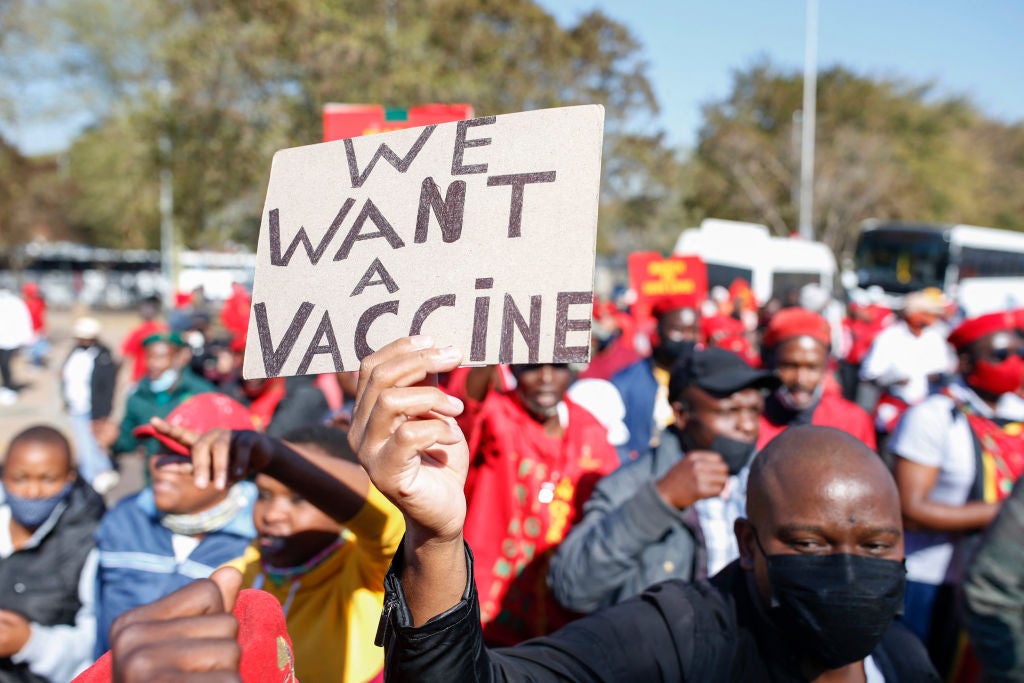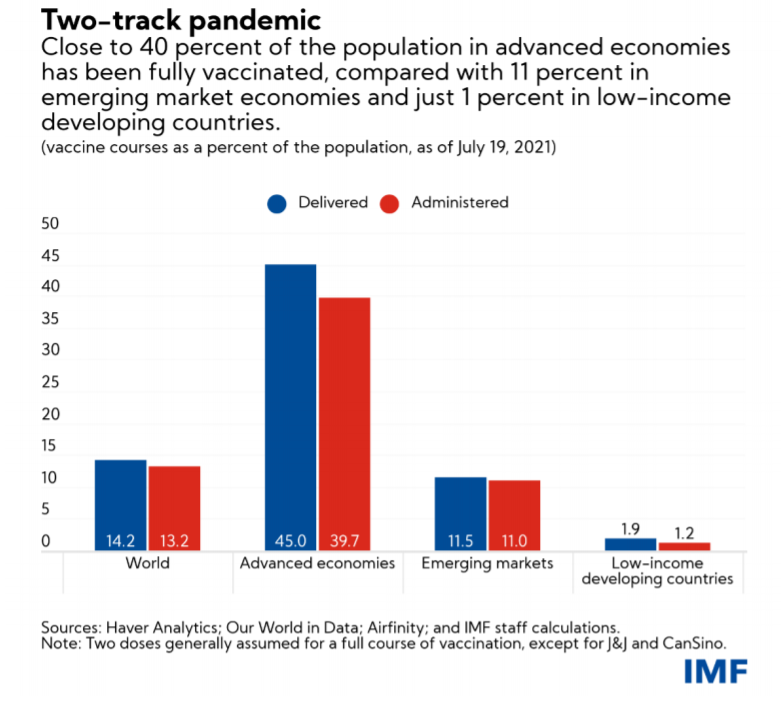Unequal access to Covid vaccines risks derailing global recovery, IMF warns
The global lender of last resort upgraded its forecast for UK GDP growth this year

The global economy is increasingly divided between vaccine haves and have-nots, the International Monetary Fund (IMF) said on Tuesday.
The outlook for the UK economy has improved since April, but Britain and other wealthy economies are not immune from the economic toll that the Covid-19 pandemic is taking elsewhere, the world’s lender of last resort warned.
Leaving so many people unvaccinated around the world means the risk of fresh variants, which might prove more infectious or escape vaccines, is heightened.
“The emergence of highly infectious virus variants could derail the recovery and wipe out $4.5 trillion cumulatively from global GDP by 2025,” wrote Gita Gopinath, the IMF’s chief economist, in a blog published alongside the lender’s latest World Economic Outlook report.
“Multilateral action is needed to ensure rapid, worldwide access to vaccines, diagnostics, and therapeutics. This would save countless lives, prevent new variants from emerging, and add trillions of dollars to global economic growth,” Ms Gopinath added.

Even with best efforts to share vaccines more equally around the world, high global infection rates are a risk in the short term, the IMF noted. This could continue to limit business travel and dampen the recovery in global services trade, a problem that could impact not just less-developed countries but also some advanced economies. The impact of this will likely be milder in countries such as the UK and Canada, which have relatively high vaccination rates, but could take a serious toll in other G20 nations, such as India, the IMF warned.
Some economists and central bank policymakers have expressed concerns about the risks of higher inflation as countries, including the UK, adjust to the lifting of pandemic-related restrictions. However, this was not the time for central banks to start raising interest rates, the IMF said. Many factors driving inflation, such as the pandemic’s disruption of supply chains, may prove temporary.
“Central banks should generally look through transitory inflation pressures and avoid tightening until there is more clarity on underlying price dynamics,” the report said. Wage costs, which can be a driver for inflation, were “broadly stable” this year, according to data from a range of wealthier countries, including Spain, Canada and the UK.
The IMF upgraded its forecast for the UK economy this year. It raised its prediction for UK GDP expansion in 2021 to 7 per cent, up from 5.3 per cent in its April forecast, matching the lender’s forecast for US growth this year. This would also be significantly higher than the 4.6 per cent average growth expected in 2021 for the eurozone, and 3.6 per cent in Germany.
However, the UK’s economy shrank more than some of the eurozone’s largest economies in 2020. GDP dropped by 9.8 per cent in 2020 in Britain, compared with a 6.5 per cent contraction in the eurozone and 4.8 per cent in Germany. The IMF trimmed its UK growth forecast for 2022 slightly, however, to 4.8 per cent, down from 5.1 per cent in its April report.
The US also received a modest upgrade to its GDP forecast from the IMF, by 0.5 percentage points for 2021.
This reflected a broader trend, according to Ms Gopinath: “Our latest global growth forecast of 6 per cent for 2021 is unchanged from the previous outlook, but the composition has changed.”
“Growth prospects for advanced economies this year have improved by 0.5 percentage point, but this is offset exactly by a downward revision for emerging market and developing economies driven by a significant downgrade for emerging Asia,” she said.
And while the picture for 2022 improved, with the IMF expecting global growth of 4.9 per cent, up from 4.4 per cent in April, this was driven by a bigger upgrade for wealthier countries, and a “more modest one” for emerging markets, Ms Gopinath said.
The British chancellor, Rishi Sunak, said it was positive that the UK’s rebound was faster than first expected, and noted that the updated forecast placed the UK’s growth rate at joint highest compared with other G7 economies.
“That said, we still face challenges ahead as a result of the impact of the pandemic, which is why we remain focused on protecting and creating as many jobs as possible through our plan for jobs,“ he added.
Join our commenting forum
Join thought-provoking conversations, follow other Independent readers and see their replies
Comments


Bookmark popover
Removed from bookmarks